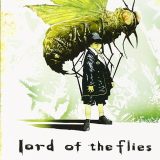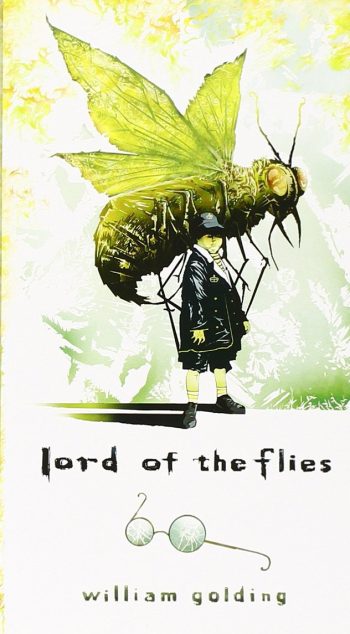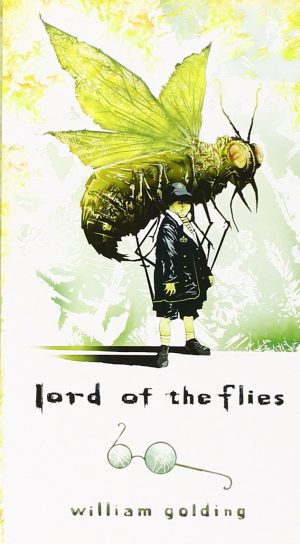Lord of the Flies – Sir William Golding – 1954
Reviewed by: Kelsey Date: 10 July 2004
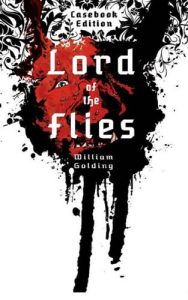 I thought this was a great work of literature that did a fabulous job of depicting the sequence of events of this group of stranded children. Although this book could be considered just a touch harsh by innocent minds, especially seeing as it was the basis for Survivor, I believe that everyone can relate to the brutal realization that humans were not created civil and are not so, once all punishments are taken away. I think everyone can relate to just about every aspect of this book. I also really enjoyed the ending from nowhere, but I’ll stop there.
I thought this was a great work of literature that did a fabulous job of depicting the sequence of events of this group of stranded children. Although this book could be considered just a touch harsh by innocent minds, especially seeing as it was the basis for Survivor, I believe that everyone can relate to the brutal realization that humans were not created civil and are not so, once all punishments are taken away. I think everyone can relate to just about every aspect of this book. I also really enjoyed the ending from nowhere, but I’ll stop there.
~
Reviewed by: D.W. Cymbalisty dcymbalisty@hotmail.com
If you are really interested in the possibilities of what it means to be a SURVIVOR… then I say turn off the T.V. and pick up Lord Of The Flies. What an amazing and worthwhile book. To take into account that this was Golding’s first published novel simply boggles the mind of anyone who has ever tried to write a book of their own. His is beautifully done. This is the story of a group of young schoolchildren (all male) evacuated from Britain in the wake of a nuclear war. As it turns out, their airplane has crashed onto an uninhabited island, with the result that there are no adult survivors to be found (this is an important feature). In the opening scenes, children begin to slowly emerge from the forest, and converge on the beach at the summons of the book’s main character, Ralph. He uses a “conch” (a large seashell) as a horn to draw the others out of their hidden areas. This conch becomes a powerful symbol of order and discipline throughout the book. As the children are now thrust together in this new environment, it becomes apparent that a new sort of social-order is going to be necessary. A few of the boys are prominent and immediately influential, while the greater majority shuffle in the periphery… a very plausible scene for any of us who have ever experienced a first day at school, etc. What follows for the length of the story is an elaborate working out of this (attempted) social order.
There is much wonderful symbolism and imagery present, especially in the characters themselves. For instance, Piggy seeming to pose for a pseudo-adult figure, continually arguing for rationality; Simon being a Christ-like symbol of purity; Roger seeming to be almost a Satan-like image of brutality etc. However, I would like to focus rather on what was, for me at least, a crucial theme of the book… the theme of group-interest versus self-interest.
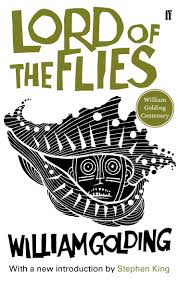 After an initial confrontation of two groups on the beach (one led by Ralph, the other led by Jack), Ralph is elected as leader. Early on, we can see that Ralph’s interests tend to be “group” oriented. His concern is with rescue, and with keeping the others focused on this objective. We see shadows in Jack however, that are more temporal, concerned with the rumble in his stomach. And here we feel perhaps the beginnings of conflict, and the age-old fact looming to remind us that, even in democracy, we need submission to leadership.
After an initial confrontation of two groups on the beach (one led by Ralph, the other led by Jack), Ralph is elected as leader. Early on, we can see that Ralph’s interests tend to be “group” oriented. His concern is with rescue, and with keeping the others focused on this objective. We see shadows in Jack however, that are more temporal, concerned with the rumble in his stomach. And here we feel perhaps the beginnings of conflict, and the age-old fact looming to remind us that, even in democracy, we need submission to leadership.
In a pivotal chapter (ch.5) one of the children declares “We’re all drifting and things are going rotten. At home there was always a grown-up.” These two sentences are significant, in that, by filling his island with castaway children (as opposed to adults) Golding allows us to consider more aspects of “innate” or instinctual human nature than if it had been otherwise. If this island were inhabited by castaway “grown-ups”, the results and conclusions they came to would be conditioned by all of the ingenuity, resourcefulness, and maturity with which they’d have dealt with previous struggles and needs. Socially, they would be able to draw upon the results (good or bad) of past decisions made in the clash and clang of more mature inclinations and inhibitions. But, for lack of experience, children are not afforded as many lessons based on past decisions as are “grown-ups”. This very fact is what often makes their individual and collective behavior all the more interesting to observe. It makes their cruelty seem all the more cruel; their sense of self-preservation all the more embryonic or primitive/savage. But then again, it makes their sense of innocent trust and devotion seem all the more pure and majestic; any acts of magnanimity or solace all the more unaccountable; their ability to work together for some common purpose seem all the more heroic or civilized! In all of these above cases, we are apt to ask… “Where does this behavior COME FROM?” In children, the profoundly BAD astounds us every bit as much as the profoundly GOOD. And that is because (whether we are aware of it or not), in observing children we’re closer to observing human nature AS IT REALLY IS than is the case with adults. In my opinion, this is why Golding inhabited his island with children. He wanted to EMPHASIZE, exaggerate if you will, the full range of possibilities in the human condition, typified in this case by Ralph’s tears on the very last page. Tears, we are told, which he wept “for the end of innocence, the darkness of man’s heart.” Love it or hate it, this book is about the darkness of man’s heart. After reading it, I mused on Golding’s choice of the (to me) obscure title… perhaps he preferred something like “Heart of Darkness” but was vexed because Joseph Conrad had beaten him to it 50 years earlier?
At any rate, true to form, as the island society progresses, a “splitting” begins. To hearken back to the Survivor series on T.V., certain “alliances” start forming. We see Jack defiantly taking a sizeable majority off with him to form his own group. Their emphasis is SURVIVAL (the short-term good) which is typified in the activity of hunting for meat. Ralph maintains his own small loyal following, and their emphasis is RESCUE (the long-term good) which is typified in the maintenance of the fire to provide smoke signals.
Golding brilliantly plays out the theme: Ralph is concerned with the group-interest, which he perceives as a return to civilization. Jack is concerned with self-interest, which he perceives as his own affirmation of power, and a resignation to fate. Jack’s recurring public appeal to the senses marks the onset of savagery.
With the frenzied killing of Simon in chapter 9 comes the real disintegration, a rapid descent into moral anarchy. Ralph seems to be the only one who begins to understand the horrifying reality of what they’ve done in this act, and further, what they’ve BECOME. He is the only one who dares to say it… “That was murder.” He has the keenest sense of the mob mentality that will inevitably run roughshod over the individual conscience. Earlier than any of the others he understands their own capacity for evil and says to Piggy, “I’m frightened. Of us. I want to go home. O God I want to go home.” The staccato effect of those first two sentences is literary genius. Much more powerful than if rolled into one.
In lieu of ruining the end of the story for those of you who have not read it, I will simply say that my heart was racing like a chased fox in the last chapter. So will yours. And when the question was flung out at the end “Who’s boss here?”… Ralph’s loud cry of “I am” rang through my very soul. Those simple words signify the triumph of perception over ignorance.
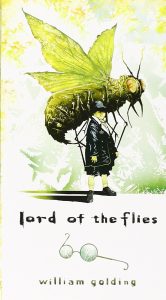 And here is the great thing… the lasting value of the book. Here we are. A whole bunch of “grown-ups.” How are we behaving? We may not be thrust up on an island ncessarily, but we are all strapped to this planet, to our country, to our community, to our families, and to ourselves for at least a little while longer, are we not?
And here is the great thing… the lasting value of the book. Here we are. A whole bunch of “grown-ups.” How are we behaving? We may not be thrust up on an island ncessarily, but we are all strapped to this planet, to our country, to our community, to our families, and to ourselves for at least a little while longer, are we not?
How is it then, that we in fact, do behave?
If we are ever tempted to be too optimistic about our answer to that question we need to recall the story yet again, and remember that the entire reason these children found themselves on this island in the first place, was that they were fleeing a nuclear war that the grownups had started.


